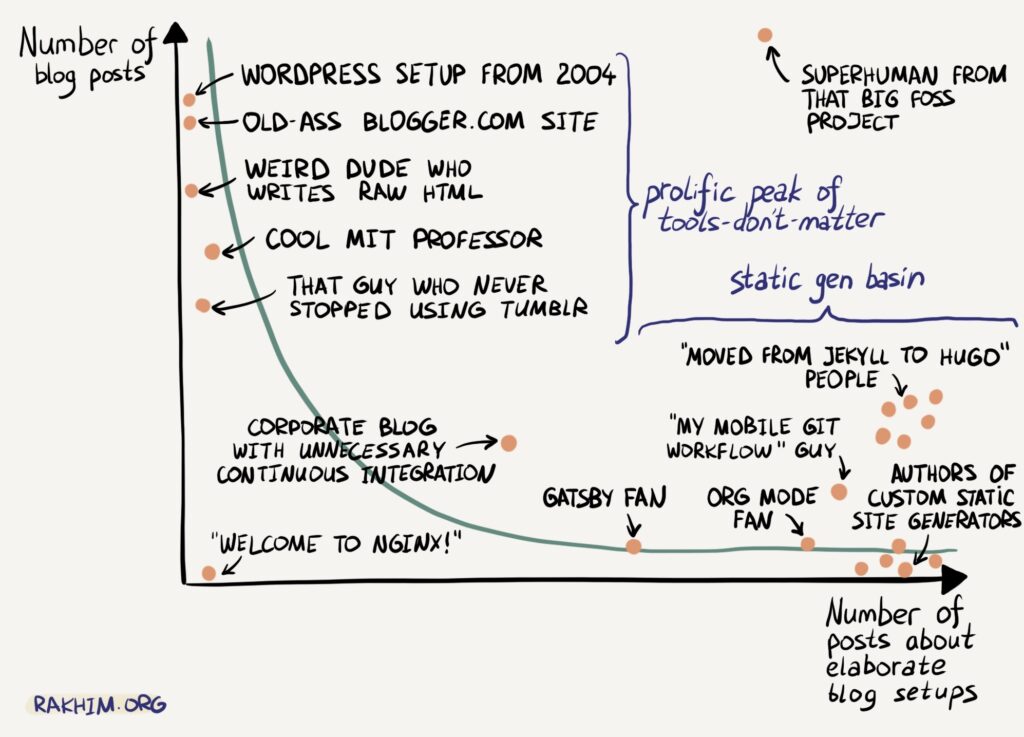Original link: https://blog.fivest.one/archives/6451
Suddenly someone came to ask, how did you manage to write a blog for so long, and you can continue to output?
(Happily, pick up the microphone:) Ah, I don’t think this is called “sustained output”. I can’t even guarantee a monthly update, and those technology-related posts can’t be regarded as “updating the blog” in my heart, and I feel contemptuous of using these numbers…
But when I saw this question, the first thing I thought of was a very important factor: probably because, this site has always been here~ My technical ability, without any extra effort, can keep this blog alive go down. Therefore, when I want to write something, there is always a place here for me to write.
——There are also many periods when I can’t write at all, and I can’t face and ruminate my own life for a long time; however, there is no need to close the website because of this, and let the blog survive there, after all, it is an outlet for expression. Probably because, I also hope that I can gradually get out of the state of “unable to organize myself” and return to the state where I can write. So the continued existence of the site is very important, because I can really feel that when I want to write something, if there is no such site, or I need to build a new one myself, I may not write…
This state of “you can write something on the site at any time” also affects the choice of blog platform (how did you turn to the technical post again? Well, I have always wanted to complain about this before, so I will mention it by the way). Over the years, there has been a debate about which is better [wordpress vs various static blogs]. Both sides do have their pros and cons. Generally speaking, the biggest advantage of a static blog is that it saves money and can be used for hosting websites such as github and vercel. But on the other hand, the process of publishing or modifying an article every time a static blog is actually full of tossing. Typically, it requires
- A fixed computer, install the static blog compilation program, and publish to github from this computer with special permissions. Instead of just turning on a computer or mobile phone, you can edit and post from the browser;
- A series of specialized actions for each post.
I have seen many people who haven’t updated for a long time. When they suddenly wanted to write an article, they forgot how to operate it, and went to the strategy to review it again; they even forgot to connect to github’s ssh-key… Maybe others think that such a toss is indifferent, Or if self-management is excellent, this situation will not occur. But I personally feel that this will affect the status of posting articles subjectively. Therefore, it feels quite important to be able to send texts intuitively anywhere, on any computer.
It seems that it is also possible to edit articles on a certain website with a browser through a series of operations, and then automatically compile and publish them to the hosting website. I didn’t pay close attention. However, if the life cycle of a blog is put on a scale of 5 to 10 years, then the complex dependencies between these websites are largely unreliable. For example, I have seen several plug-in comment systems for static blogs, and I don’t know why they don’t work… In short, I would rather use those free blog platforms with advertisements.
My recommendation for new bloggers has always been——
- If you have the technical ability and a server, build wordpress yourself;
- Or get someone to rub one. If we are familiar, you can buy a domain name and hang your blog on my server. This is not a huge burden. (ps, personal wordpress small site, it is not necessary to install the expensive mysql database);
- If none of the above two options work, then I would recommend registering the ready-made wordpress.com or blogspot.com first. At present, it seems that these two are the only long-term reliable ones. Although the interface of the free version is not good-looking and there are advertisements, it should be no problem to write for a long time;
- Of course, I’m not going to pour cold water on people who are willing to try static blogging. But I will worry secretly based on your technical ability and temperament:
- How long can you keep writing;
- Will a lot of what you write be about your experience and thoughts on how to build a website…
Turning a picture , for those who are familiar with the changes of the blog platform in the past ten years, it should be very funny: people who write blogs with different tools, (write blog articles) vs (write articles about how to configure blogs) comparison. The terms in the lower right corner are in different ages and require various degrees of tossing. Static blog solutions: gatsby, org mode, jekyll, hugo, git workflow…

ps, two months ago, I used this code scheme to import all my po articles on twitter into the self-built mastodon. Twitter should gradually give up following Elon Musk’s unreliable toss. And the character limit for each tweet has changed from 140 characters on twitter to 500 characters on mastodon, and the feeling of hundreds of characters is more hesitant than ever to write it on the blog. How to deal with it, I haven’t figured it out yet.
This article is transferred from: https://blog.fivest.one/archives/6451
This site is only for collection, and the copyright belongs to the original author.